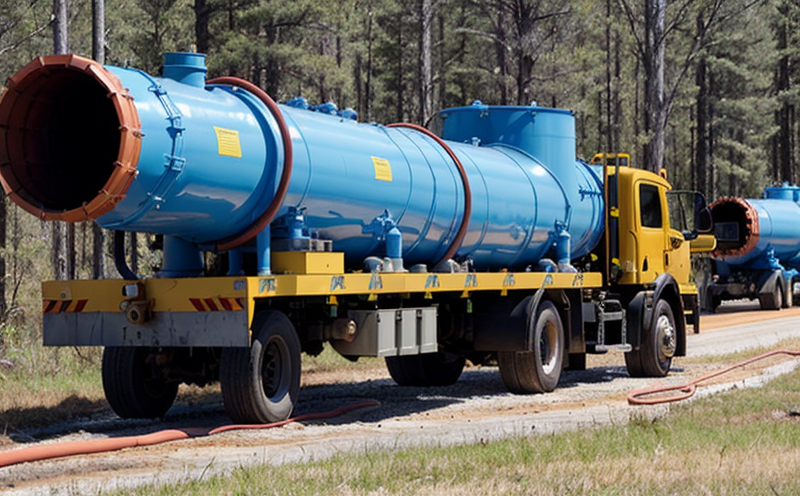ASTM D1945 Hydrocarbon Composition Testing of Natural Gas
The ASTM D1945 standard provides a method to determine the hydrocarbon composition of natural gas. This is crucial for ensuring that natural gas distribution pipelines and networks operate efficiently, safely, and comply with regulatory requirements.
This service focuses on the accurate measurement of key components such as methane (CH4) and ethane (C2H6) in natural gas. The testing ensures that the composition meets the specified quality standards, which are critical for pipeline integrity and safety.
The process involves a series of steps to ensure precision and accuracy. First, a representative sample is collected from the pipeline or storage facility. This specimen must be free from contamination and accurately reflect the overall composition of the gas within the pipeline. The sample is then transferred to an analytical laboratory for testing.
One of the most important pieces of instrumentation used in this process is the gas chromatograph (GC). This instrument separates the different components based on their boiling points, allowing for precise measurement. The GC is paired with a flame ionization detector (FID) that detects the presence and concentration of hydrocarbons.
After analysis, the results are compared against the standards set by ASTM D1945. These standards provide specific criteria for acceptable ranges of each component in natural gas. Compliance with these standards is essential to ensure safe transportation and use of the gas.
The testing process also involves a thorough examination of the sample under various conditions, including temperature and pressure variations that might affect the hydrocarbon composition. This ensures that the results are not only accurate but also reliable across different operational scenarios in natural gas distribution networks.
Compliance with ASTM D1945 is particularly important for quality managers and compliance officers responsible for ensuring that natural gas meets all regulatory requirements. R&D engineers use this data to optimize pipeline operations, while procurement teams rely on it to source high-quality natural gas.
- Precision: Ensures accurate measurement of hydrocarbon components.
- Reliability: Consistent results across different conditions and environments.
- Regulatory Compliance: Meets all national and international standards for natural gas quality.
- Safety: Protects against potential hazards in the transportation and distribution of natural gas.
The importance of this testing cannot be overstated. Natural gas is a vital resource, and its safe and efficient distribution is paramount to both environmental sustainability and public safety. By adhering to ASTM D1945, we ensure that every aspect of natural gas handling meets the highest standards in the industry.
Applied Standards
The ASTM D1945 Standard Test Method for Determination of Hydrocarbon Composition of Natural Gas is widely recognized and used by regulatory bodies, pipeline operators, and natural gas producers. This standard provides a comprehensive framework for the accurate determination of hydrocarbon composition in natural gas.
The process described in ASTM D1945 involves several key steps:
- Sampling: A representative sample is taken from the natural gas stream, ensuring it accurately reflects the overall composition.
- Preparation: The sample undergoes a series of preparatory steps to ensure that it is in a suitable form for analysis. This may include dilution or concentration as necessary.
- Analysis: The prepared sample is analyzed using gas chromatography (GC) with flame ionization detection (FID). The GC separates the various hydrocarbon components based on their boiling points, and FID detects them accurately.
- Data Analysis: The results of the analysis are compared against the specified ranges provided in ASTM D1945. Any deviations from these ranges are noted and addressed as necessary.
The standard also provides guidance on sample handling, equipment calibration, and data interpretation to ensure consistency and accuracy across different laboratories and operators.
By adhering strictly to the procedures outlined in ASTM D1945, we can provide reliable and consistent results that are essential for the safe and efficient operation of natural gas distribution systems.
Use Cases and Application Examples
The ASTM D1945 hydrocarbon composition testing is used in a variety of applications within the natural gas distribution sector:
- Pipeline Integrity Monitoring: Regular testing helps identify any changes in the composition that could indicate potential integrity issues.
- Quality Assurance: Ensures that each batch of natural gas meets specified quality standards before being distributed to consumers.
- Risk Management: By monitoring hydrocarbon levels, operators can manage risks associated with deviations from standard compositions.
- Environmental Compliance: Ensures that the distribution and use of natural gas aligns with environmental regulations.
In practice, this testing is performed at multiple points along the pipeline network. Sampling stations are strategically located to capture representative samples that reflect the overall composition throughout the system.
For instance, a major utility company might conduct monthly tests across all its distribution networks to ensure compliance with standards and identify any anomalies early on. This proactive approach not only enhances safety but also helps in optimizing resource allocation for maintenance and upgrades.
Contact Us for Expert Hydrocarbon Composition Testing
For more information or to schedule a hydrocarbon composition test, please contact us today. Our team of experts will work closely with you to ensure that your natural gas distribution systems meet all necessary standards.





